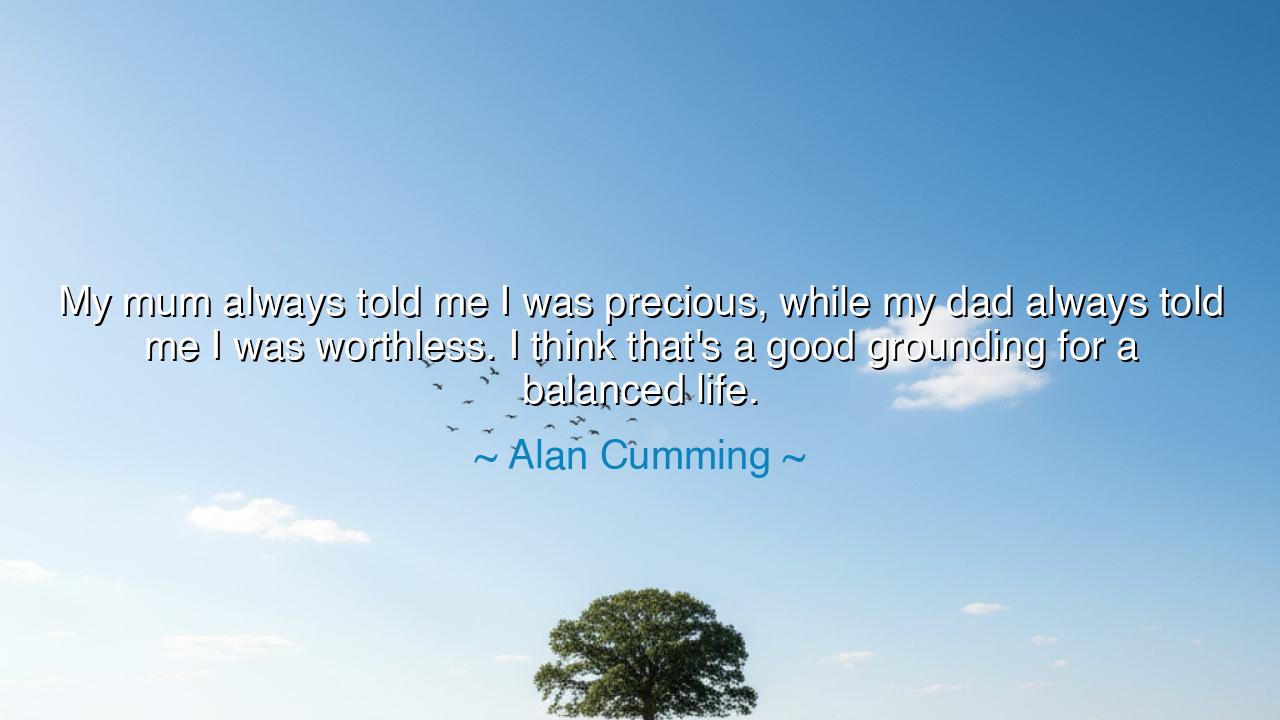
My mum always told me I was precious, while my dad always told me
My mum always told me I was precious, while my dad always told me I was worthless. I think that's a good grounding for a balanced life.





“My mum always told me I was precious, while my dad always told me I was worthless. I think that's a good grounding for a balanced life.” — Alan Cumming
Thus spoke Alan Cumming, the actor of wit and depth, whose words pierce the veil of childhood and reveal the strange alchemy by which pain and love together shape the human spirit. His words, though spoken with humor, hold within them the paradox of truth — that to live a balanced life, one must taste both the sweetness of affirmation and the bitterness of rejection. For man is not made whole by comfort alone. It is the tension between praise and criticism, between hope and humility, that forges a soul capable of wisdom.
The origin of this quote lies in Cumming’s own life, born into a household where affection and cruelty coexisted in uneasy harmony. His mother, a wellspring of kindness, saw in him the light of potential — she called him precious, and in doing so, gave him the strength to believe in his worth. His father, harsh and unyielding, called him worthless, and in doing so, perhaps without intending, gave him the strength to prove otherwise. Between these two forces — one lifting him up, the other pressing him down — Alan Cumming found balance. For if love fills the heart too much, it may drift into pride; but if scorn weighs too heavily, it may crush the spirit. The balance of the two teaches endurance, perspective, and grace.
In this way, Cumming’s words echo the wisdom of the ancient philosophers, who knew that virtue is found not in excess, but in the middle path — the Golden Mean. Aristotle himself taught that courage lies between cowardice and recklessness; generosity between stinginess and extravagance. So too does self-knowledge lie between arrogance and despair. The child who is told only that he is precious grows vain and fragile; the one told only that he is worthless grows broken and bitter. But the one who has heard both — who has learned that he is at once flawed and worthy — walks the earth with humility and strength.
Consider the story of Abraham Lincoln, born in poverty and self-doubt, yet raised by a mother who filled him with quiet faith. His father, distant and unimpressed, thought little of his bookish son. From that dual inheritance — his mother’s love and his father’s severity — arose a man who would lead a nation through its darkest hour. He neither overvalued himself nor surrendered to despair. He understood both tenderness and toughness, and this equilibrium made him both compassionate and unbreakable. So it is with all who are forged by opposing forces — they emerge tempered like steel, not brittle like glass.
Cumming’s statement also carries an irony that glimmers with truth. When he says it gave him a “good grounding,” he does not glorify pain, but acknowledges its strange necessity. The contradiction of being called both precious and worthless taught him to seek self-worth not in the voices of others, but in his own understanding. For when love and cruelty coexist, the soul learns to discern its own truth. It learns to say, “I am not what they call me; I am what I choose to be.” This is the great transformation of suffering — that it turns dependence into self-awareness, and wounds into wisdom.
The lesson, then, is this: do not despise the opposites that life gives you. When the world praises you, remember your imperfections; when it condemns you, remember your worth. Let love teach you gentleness, and hardship teach you strength. Together, they will anchor you — one keeping your feet on the earth, the other lifting your gaze toward the stars. The soul that has known both warmth and cold becomes resilient, capable of compassion without weakness, confidence without pride.
So, my child of the future, heed this truth: balance is born from contrast. Cherish the kindness that nourishes you, but do not fear the hardships that humble you. When you are told you are precious, take it as a call to honor your gifts; when you are told you are worthless, take it as a challenge to prove your worth through action, not pride. For the fully awakened heart lives between the two — never enslaved by praise, never destroyed by scorn, but walking with steady grace through both light and shadow. And in that balance, as Alan Cumming knew, lies the secret strength of a truly grounded life.






AAdministratorAdministrator
Welcome, honored guests. Please leave a comment, we will respond soon